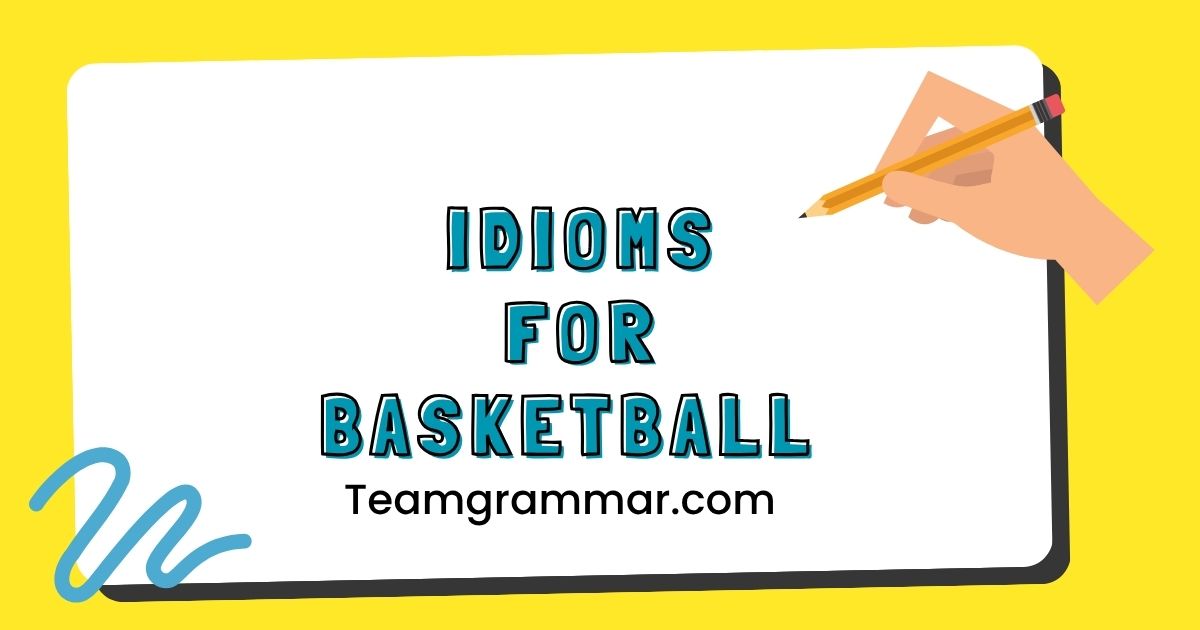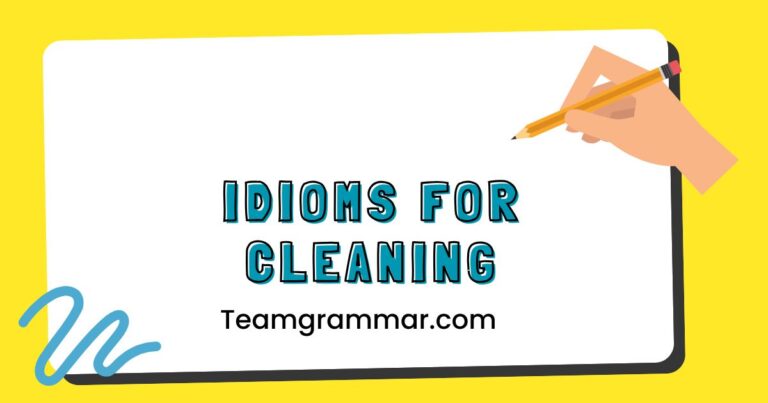29 Basketball Idioms: Score Big with Figurative Language
Understanding idioms is crucial for mastering English, as they add color and nuance to everyday conversations. Basketball idioms, specifically, offer a unique window into American culture and the language used to describe teamwork, competition, and success.
This article will explore common basketball idioms, their meanings, and how to use them correctly. Whether you’re an English language learner, a sports enthusiast, or simply looking to expand your vocabulary, this guide will help you understand and use basketball idioms effectively.
By learning these expressions, you’ll not only enhance your comprehension but also gain a deeper appreciation for the cultural context in which they are used.
This article is designed for English language learners of all levels, from beginner to advanced, as well as native English speakers interested in sports terminology. We will cover the definitions, structures, and usage rules of various basketball idioms.
Through examples, practice exercises, and explanations of common mistakes, you’ll gain a solid understanding of how to incorporate these idioms into your everyday language. This comprehensive guide ensures that you can confidently use basketball idioms to express yourself more vividly and accurately.
Table of Contents
- Definition of Basketball Idioms
- Structural Breakdown of Basketball Idioms
- Types or Categories of Basketball Idioms
- Examples of Basketball Idioms
- Usage Rules for Basketball Idioms
- Common Mistakes with Basketball Idioms
- Practice Exercises
- Advanced Topics
- FAQ: Frequently Asked Questions
- Conclusion
Definition of Basketball Idioms
Basketball idioms are figurative expressions that use basketball terminology to convey meanings beyond their literal definitions. These idioms are often used to describe situations, behaviors, or outcomes in contexts far removed from the basketball court.
Understanding these idioms requires recognizing the implied meaning rather than simply translating the words literally.
Idioms, in general, are a type of figurative language where the meaning cannot be deduced from the individual words. They are an integral part of everyday language, especially in informal settings.
In the context of basketball, these idioms often reflect the values and dynamics of the sport, such as teamwork, competition, and the pursuit of victory.
Basketball idioms function as a form of shorthand, allowing speakers to quickly and effectively communicate complex ideas or emotions. They add color and vibrancy to language, making it more engaging and relatable.
These idioms are commonly used in business, politics, and everyday conversations to illustrate points or emphasize particular aspects of a situation. For instance, saying someone “dropped the ball” implies they made a mistake or failed to fulfill a responsibility, regardless of whether the situation involves an actual ball.
Structural Breakdown of Basketball Idioms
The structure of basketball idioms varies, but they typically consist of a combination of basketball-related terms and common English words. Understanding the structural elements can help in deciphering the meaning and usage of these idioms.
They often involve verbs, nouns, and prepositions that, when combined, create a unique idiomatic meaning.
Many basketball idioms are based on action verbs that describe specific plays or movements in the game. For example,”to dribble away time”uses the verb “dribble” to mean wasting time or stalling.
Similarly,”to pass the buck”uses the verb “pass” to mean shifting responsibility to someone else. These verbs provide the core action or state being described in the idiom.
Nouns in basketball idioms typically refer to elements of the game, such as the ball, the court, or specific positions. For instance,”to have the ball in your court”uses the noun “ball” to represent responsibility or the next move in a situation.
The noun provides the subject or object of the idiom, giving it context and meaning. Prepositions often play a crucial role in establishing the relationship between the verb and the noun, further shaping the idiom’s meaning.
For example, in the idiom”out of bounds,”the preposition “out of” indicates a state of being beyond acceptable limits.
Understanding the structural components of basketball idioms allows for a deeper comprehension of their meaning and usage. By recognizing the verbs, nouns, and prepositions at play, you can better interpret the figurative language and use these idioms more effectively in your own communication.
The patterns and rules governing these idioms are often subtle but consistent, making them easier to learn with practice and exposure.
Types or Categories of Basketball Idioms
Basketball idioms can be categorized based on the themes they represent. Common categories include teamwork, competition, success, and failure.
Each category reflects different aspects of the game and provides a unique perspective on the situations they describe.
Teamwork Idioms
Teamwork idioms emphasize the importance of collaboration and cooperation. These idioms often describe how individuals work together to achieve a common goal and highlight the benefits of mutual support and coordination.
Understanding these idioms can enhance communication in team-oriented environments.
Competition Idioms
Competition idioms focus on the rivalry and challenges inherent in competitive situations. These idioms often describe the struggle to outperform opponents and the strategies used to gain an advantage.
They reflect the intensity and pressure associated with competitive environments.
Success Idioms
Success idioms celebrate achievements and accomplishments. These idioms often describe the satisfaction of attaining goals and the rewards of hard work and dedication.
Understanding these idioms can boost morale and foster a positive attitude toward achieving success.
Failure Idioms
Failure idioms address setbacks and mistakes. These idioms often describe the consequences of poor decisions or unsuccessful attempts.
They offer insights into how to learn from failures and bounce back from adversity. Understanding these idioms can help in developing resilience and a growth mindset.
Examples of Basketball Idioms
Here are several examples of basketball idioms, categorized by their respective themes. Each example includes the idiom, its meaning, and an example sentence to illustrate its usage.
These examples will help you understand how to use these idioms correctly in various contexts.
Teamwork Examples
The following table provides examples of teamwork idioms, their meanings, and example sentences. These idioms highlight the importance of cooperation and collaboration in achieving common goals.
Understanding these expressions can help you communicate more effectively in team-oriented settings.
| Idiom | Meaning | Example Sentence |
|---|---|---|
| Pass the ball | Share responsibility or delegate tasks | Instead of trying to do everything yourself, pass the ball to your team members who have the expertise. |
| Team player | Someone who works well with others | She’s a real team player; she always puts the needs of the group before her own. |
| Nothing but net | Perfect execution or success | The presentation was nothing but net; the audience loved it. |
| Full-court press | Intense, all-out effort | The sales team put on a full-court press to meet the quarter’s targets. |
| Alley-oop | A collaborative effort that leads to success | Their partnership was an alley-oop, leading to a series of successful projects. |
| Pick and roll | A strategy involving cooperation and coordination | The company used a pick and roll strategy to overcome the competition. |
| Fast break | Taking advantage of an opportunity quickly | They initiated a fast break to seize the market share before others could react. |
| Give and go | A reciprocal exchange of ideas or support | The discussion was a give and go, with everyone contributing valuable insights. |
| Baseline strategy | A fundamental or foundational approach | A baseline strategy is essential for any business to maintain profitability. |
| Zone defense | Protecting a specific area or responsibility | Each department applied a zone defense to ensure all critical areas were covered. |
| Bench warmer | Someone who doesn’t actively participate | He was a bench warmer in the meeting, never offering any input. |
| Sixth man | A supportive team member who contributes significantly | She was the sixth man on the project, always ready to help and offer solutions. |
| Double team | Two people working together to overcome a challenge | They decided to double team the problem to find a solution more quickly. |
| Assist | Helping someone achieve their goal | He provided a crucial assist by connecting us with the right contacts. |
| Rebound | Recovering from a setback or failure | After the initial rejection, they worked hard to rebound and secure the deal. |
| Three-point play | Achieving multiple objectives at once | The new marketing campaign was a three-point play, increasing sales, brand awareness, and customer loyalty. |
| Paint presence | Having a strong and dominant presence | The company established a strong paint presence in the industry by offering innovative solutions. |
| Box out | Preventing someone from achieving their goal | They had to box out the competition to secure the contract. |
| In the paint | Being in the midst of activity or conflict | The negotiations were intense, and they were right in the paint, dealing with tough issues. |
| Screen play | Creating opportunities for others | The manager used a screen play to help his team members shine. |
| Pick up the slack | To take on extra responsibilities when someone else is unable to | When John had to take a leave of absence, Sarah picked up the slack and kept the project on track. |
| Carry the team | To be the main contributor to a group’s success | Although everyone worked hard, Maria really carried the team with her innovative ideas and tireless effort. |
| On the same page | To be in agreement or understanding with others | Before we start the project, let’s make sure everyone is on the same page regarding the goals and timelines. |
Competition Examples
The following table provides examples of competition idioms, their meanings, and example sentences. These idioms capture the intensity and challenges of competitive environments.
Understanding these expressions can help you describe and navigate competitive situations more effectively.
| Idiom | Meaning | Example Sentence |
|---|---|---|
| Slam dunk | An easy and decisive victory | The new product launch was a slam dunk; it exceeded all expectations. |
| Game changer | Something that significantly alters the outcome | The new technology was a game changer for the industry. |
| Take it to the hoop | To aggressively pursue a goal | He decided to take it to the hoop and close the deal before the end of the week. |
| Above the rim | Exceptional or superior performance | Her presentation was above the rim; she impressed everyone with her knowledge and delivery. |
| From downtown | From a long distance or with great effort | He scored from downtown by securing the funding through unconventional methods. |
| Air ball | A complete failure or missed opportunity | His attempt to impress the client was an air ball; he didn’t connect with them at all. |
| Brick | A poor attempt or failure | His presentation was a brick; he completely missed the mark. |
| Foul out | Being disqualified or eliminated due to repeated mistakes | He fouled out of the competition due to repeated violations of the rules. |
| Ball hog | A person who dominates and doesn’t share | He’s such a ball hog; he never lets anyone else lead the project. |
| Play hardball | To be aggressive and uncompromising in negotiations | They had to play hardball to get the best deal from the suppliers. |
| Run interference | To protect someone from obstacles or criticism | The manager had to run interference for his team to shield them from unnecessary distractions. |
| Pressing game | Applying constant pressure to achieve a goal | The company adopted a pressing game to increase sales and market share. |
| In the zone | Being in a state of peak performance | She was in the zone during the presentation, delivering a flawless performance. |
| Jump ball | An equal start or a situation where both sides have a chance | The negotiations started as a jump ball, with both companies having equal leverage. |
| Man-to-man defense | A direct and personal approach to handling challenges | They used a man-to-man defense to address each customer’s specific concerns. |
| Out of bounds | Beyond acceptable limits or inappropriate | His behavior was out of bounds and unacceptable in a professional setting. |
| Bench the player | Removing someone from a position due to poor performance | They had to bench the player because he wasn’t contributing to the team’s success. |
| Call the shots | To make the decisions and be in control | As the CEO, she gets to call the shots and set the direction for the company. |
| Move the goalposts | Changing the rules or expectations unfairly | They kept moving the goalposts, making it impossible to meet their demands. |
| Blow the whistle | To expose wrongdoing or illegal activities | He decided to blow the whistle on the company’s fraudulent practices. |
| Behind the back | Doing something secretively or without someone’s knowledge | He felt betrayed when he learned they were negotiating behind his back. |
| Dribble away time | Wasting time or delaying progress | Instead of making a decision, he was just dribbling away time and avoiding the issue. |
| Nothing but net | Perfect execution or success | The presentation was nothing but net; the audience loved it. |
Success Examples
The following table provides examples of success idioms, their meanings, and example sentences. These idioms celebrate achievements and highlight the rewards of hard work and dedication.
Understanding these expressions can help you express your own successes and recognize the achievements of others.
| Idiom | Meaning | Example Sentence |
|---|---|---|
| Score big | Achieve great success | The company scored big with its new product, earning record profits. |
| Win by a landslide | Achieve an overwhelming victory | The candidate won the election by a landslide, securing a clear mandate. |
| Take home the trophy | Win a competition or achieve a major victory | After years of hard work, they finally took home the trophy, winning the championship. |
| Net a profit | Earn a significant profit or gain | The investment netted a substantial profit, exceeding all expectations. |
| Make the cut | Succeed in passing a selection process | She worked hard and finally made the cut, securing a spot on the team. |
| Hit the mark | Achieve the desired outcome or goal | The marketing campaign hit the mark, significantly increasing brand awareness. |
| Be a winner | Demonstrate qualities of success and achievement | He’s a natural leader and a winner, always inspiring his team to perform their best. |
| Come out on top | Achieve victory or success after a struggle | Despite the challenges, they came out on top and achieved their goals. |
| Seal the deal | Finalize an agreement or secure a victory | He sealed the deal by offering attractive terms, securing the partnership. |
| Ace the test | Perform exceptionally well on an exam or challenge | She aced the test, demonstrating her mastery of the subject. |
| Nail it | Perform perfectly or achieve a flawless result | He nailed the presentation, impressing the audience with his expertise. |
| Break the record | Surpass a previous achievement or milestone | The company broke the record for sales, achieving unprecedented growth. |
| Clinch the victory | Secure a win or achieve a definitive success | They clinched the victory with a last-minute goal, winning the championship. |
| Dominate the game | Exert strong control and achieve superior performance | The team dominated the game, showcasing their skill and teamwork. |
| Rise to the occasion | Perform exceptionally well under pressure or in a critical situation | She rose to the occasion and delivered a brilliant speech, inspiring the audience. |
| Stand out from the crowd | Be unique and exceptional compared to others | His innovative ideas allowed him to stand out from the crowd and gain recognition. |
| Exceed expectations | Perform better than anticipated | The project exceeded expectations, delivering results beyond what was initially projected. |
| Reach new heights | Achieve unprecedented levels of success | The company reached new heights with its groundbreaking technology, revolutionizing the industry. |
| Take the lead | Assume a leadership position and guide others to success | He took the lead and guided the team to achieve their goals. |
| Make a splash | Create a significant impact or impression | The new product made a splash in the market, attracting widespread attention. |
| Get a leg up | Gain an advantage or head start | Networking provided her with a leg up in her career. |
| On a roll | Experiencing a period of continuous success | Since the new product launch, the company has been on a roll with increasing profits. |
| Come out swinging | To start something with great enthusiasm and energy | The team came out swinging, winning the first few games of the season. |
Failure Examples
The following table provides examples of failure idioms, their meanings, and example sentences. These idioms address setbacks and mistakes, offering insights into learning from failures and bouncing back from adversity.
Understanding these expressions can help you navigate challenges and develop resilience.
| Idiom | Meaning | Example Sentence |
|---|---|---|
| Drop the ball | Make a mistake or fail to fulfill a responsibility | He dropped the ball by missing the deadline for the project. |
| Miss the mark | Fail to achieve the desired outcome or goal | The marketing campaign missed the mark, failing to attract the target audience. |
| Fall short | Fail to meet expectations or requirements | The company fell short of its sales targets for the quarter. |
| Strike out | Fail completely or unsuccessfully attempt something | He struck out when he tried to negotiate a better deal with the supplier. |
| Lose the game | Suffer a defeat or fail to achieve victory | They lost the game due to a series of critical errors. |
| Fumble the ball | Make a mistake or mishandle a situation | He fumbled the ball during the presentation, losing the client’s interest. |
| Be a loser | Experience consistent failure or defeat | He was labeled a loser after a series of unsuccessful ventures. |
| Go down in flames | Fail spectacularly or disastrously | The project went down in flames due to poor planning and execution. |
| Hit a wall | Encounter a significant obstacle or reach a point of stagnation | The company hit a wall when it tried to expand into new markets. |
| Crash and burn | Fail dramatically and catastrophically | The startup crashed and burned due to a lack of funding and poor management. |
| Take a dive | Deliberately fail or underperform | The athlete was accused of taking a dive to influence the outcome of the competition. |
| Get benched | Be removed from a position due to poor performance | He got benched after a series of poor decisions that cost the company money. |
| End up in the gutter | Experience a significant decline or downfall | After losing his job and facing financial difficulties, he ended up in the gutter. |
| Go belly up | Fail financially and go bankrupt | The business went belly up due to mismanagement and declining sales. |
| Suffer a setback | Experience a temporary reversal or obstacle | The project suffered a setback due to unforeseen technical issues. |
| Go off the rails | Deviate from the intended course or plan | The negotiations went off the rails due to disagreements over key terms. |
| Run out of steam | Lose energy or momentum | The project ran out of steam due to a lack of resources and support. |
| Come to nothing | Fail to achieve any positive result | His efforts came to nothing, as the project was ultimately canceled. |
| Miss the boat | Miss an opportunity or be too late to take advantage of something | He missed the boat by not investing in the company when it was first starting out. |
| Go south | Deteriorate or worsen | The relationship went south after a series of misunderstandings. |
| Leave it on the court | Giving the best effort, even if unsuccessful | The team left it on the court, but lost the game. |
| Dead-end job | A job with no opportunity for advancement | He realized his job was a dead-end job with no chance of moving up the corporate ladder. |
| Back to square one | Having to start over from the beginning | After the project failed, the team was back to square one. |
Usage Rules for Basketball Idioms
Using basketball idioms correctly requires understanding their specific meanings and contexts. While these idioms add color and expressiveness to language, using them inappropriately can lead to confusion or miscommunication.
It’s important to consider the audience and the situation before using these idioms.
Consistency is key when using idioms. Ensure that the idiom fits the context of the sentence and that the tense and verb agreement are correct.
For example, if you’re referring to a past event, use the past tense form of the idiom. Also, be aware of any regional variations in the meaning or usage of the idiom.
Avoid mixing idioms, as this can create nonsensical or confusing sentences. Each idiom has a specific structure and meaning, and combining elements from different idioms can result in unintended and often humorous effects.
For instance, avoid saying something like “He dropped the ball and hit a home run,” as it combines two different idioms with contradictory meanings.
Consider the formality of the situation. While basketball idioms can be effective in informal conversations, they may not be appropriate for formal presentations or written documents.
In such cases, it’s best to use more direct and literal language to ensure clarity and professionalism. Always be mindful of your audience and adapt your language accordingly.
Common Mistakes with Basketball Idioms
One common mistake is taking idioms literally. Because idioms are figurative, interpreting them word-for-word can lead to misunderstandings.
For example, “dropping the ball” doesn’t literally mean dropping a physical ball; it means making a mistake or failing to fulfill a responsibility.
Another frequent error is using the wrong form of the idiom. Idioms are fixed expressions, and changing the words or structure can alter their meaning or make them nonsensical.
For instance, saying “drop the sphere” instead of “drop the ball” changes the idiom and loses its intended meaning. Always use the idiom exactly as it is commonly known.
Using idioms out of context is another common mistake. Idioms are often specific to certain situations or types of conversations.
Using them inappropriately can make your language sound awkward or out of place. For example, using a basketball idiom in a formal business presentation might not be well-received.
Here’s a table illustrating some common mistakes and their corrections:
| Incorrect | Correct | Explanation |
|---|---|---|
| He dropped the sphere. | He dropped the ball. | Using the wrong word changes the idiom. |
| She missed the boat train. | She missed the boat. | The correct idiom is “missed the boat.” |
| They will strike away. | They will strike out. | “Strike out” is the correct form for failure. |
| He scored small. | He scored big. | “Score big” signifies great success. |
| She is a team player person. | She is a team player. | Adding “person” is redundant. |
Practice Exercises
These practice exercises will help you reinforce your understanding of basketball idioms. Each exercise focuses on different aspects of using idioms correctly.
Complete these exercises to test your knowledge and improve your skills.
Exercise 1: Fill in the Blanks
Fill in the blanks with the correct basketball idiom from the list provided.
Idiom List: drop the ball, slam dunk, team player, game changer, take it to the hoop, bench warmer
| Question | Answer |
|---|---|
| 1. He really _______ when he forgot to submit the report on time. | drop the ball |
| 2. The new marketing strategy was a _______ for the company. | game changer |
| 3. She’s a true _______, always willing to help her colleagues. | team player |
| 4. The product launch was a _______; it was an easy and decisive victory. | slam dunk |
| 5. He decided to _______ and aggressively pursue the new client. | take it to the hoop |
| 6. He was a _______, never contributing to the team’s success. | bench warmer |
| 7. If we want to win this contract, we need to _______ and show them what we’re made of. | take it to the hoop |
| 8. This new software is a _______; it will completely transform our workflow. | game changer |
| 9. Unfortunately, he _______ and missed the deadline, causing major problems. | drop the ball |
| 10. This project is a _______ for us; we need to make sure it succeeds. | slam dunk |
Exercise 2: Idiom Matching
Match the basketball idiom with its correct meaning.
| Idiom | Meaning |
|---|---|
| 1. Full-court press | a. Make a mistake |
| 2. Air ball | b. Share responsibility |
| 3. Pass the ball | c. Complete failure |
| 4. Drop the ball | d. Intense effort |
| 5. Score big | e. Achieve great success |
Answers:
- 1 – d
- 2 – c
- 3 – b
- 4 – a
- 5 – e
Exercise 3: Sentence Creation
Create a sentence using each of the following basketball idioms.
| Idiom | Sentence |
|---|---|
| 1. Game changer | The new CEO was a game changer for the company, transforming its culture and performance. |
| 2. Team player | She is a dedicated team player who always puts the group’s needs first. |
| 3. Slam dunk | The successful product launch was a slam dunk for the marketing team. |
| 4. Drop the ball | He dropped the ball by forgetting to confirm the meeting with the client. |
| 5. Full-court press | The sales team put on a full-court press to meet their end-of-year targets. |
| 6. Air ball | His attempt to impress the investors was an air ball; they weren’t interested in his pitch. |
| 7. Sixth man | She was the sixth man on the project, always ready to help and offer solutions. |
| 8. Foul out | He fouled out of the competition due to repeated violations of the rules. |
| 9. Pressing game | The company adopted a pressing game to increase sales and market share. |
| 10. Jump ball | The negotiations started as a jump ball, with both companies having equal leverage. |
Advanced Topics
For advanced learners, exploring the etymology and cultural context of basketball idioms can provide a deeper understanding of their usage. Many of these idioms originated from specific moments or figures in basketball history, and understanding their origins can add nuance to their meaning.
Researching the historical context can also reveal how these idioms have evolved over time.
Another advanced topic is the use of basketball idioms in different professional fields. While these idioms are commonly used in business, politics, and sports commentary, their usage can vary depending on the specific field and audience.
Analyzing how these idioms are adapted and applied in different contexts can enhance your ability to use them effectively.
Consider the use of basketball idioms in literature and media. Many writers and filmmakers use these idioms to add authenticity and relatability to their work.
Studying how these idioms are incorporated into storytelling can provide valuable insights into their expressive potential and cultural significance. For instance, analyzing the dialogue in sports-themed movies or novels can reveal how these idioms are used to convey character traits, plot developments, and thematic elements.
FAQ: Frequently Asked Questions
Here are some frequently asked questions about basketball idioms, along with detailed answers to help clarify any confusion.
- What is an idiom?
An idiom is a phrase or expression
that uses figurative language to convey a meaning that is different from the literal meaning of its individual words. Idioms are commonly used in everyday language to add color and nuance to communication.
- Why are basketball idioms important for English language learners?
Basketball idioms are important because they are frequently used in American English, particularly in informal and sports-related contexts. Understanding these idioms can help English language learners better comprehend conversations, media, and literature, as well as express themselves more effectively.
- Can I use basketball idioms in formal writing?
Generally, basketball idioms are more appropriate for informal conversations and less formal writing. In formal writing, it is often better to use more direct and literal language to ensure clarity and professionalism. However, the appropriateness of using idioms depends on the specific context and audience.
- How can I improve my understanding of basketball idioms?
To improve your understanding of basketball idioms, you can:
- Read articles and books that use these idioms.
- Watch sports commentary and interviews.
- Practice using idioms in conversations with native English speakers.
- Use online resources and language learning apps.
- Are basketball idioms used in other languages?
While some languages may have equivalent expressions, basketball idioms are primarily used in English-speaking countries, particularly in the United States. Other languages may have their own sports-related idioms that reflect their cultural context.
- What are some common mistakes to avoid when using basketball idioms?
Common mistakes to avoid include:
- Taking idioms literally.
- Using the wrong form of the idiom.
- Using idioms out of context.
- Mixing different idioms.
- How can I find more examples of basketball idioms?
You can find more examples of basketball idioms by:
- Searching online dictionaries and idiom resources.
- Reading sports articles and blogs.
- Watching basketball games and listening to commentary.
- Consulting with native English speakers.
Conclusion
Basketball idioms offer a unique and colorful way to express ideas and emotions in English. By understanding their meanings, structures, and usage rules, you can enhance your comprehension and communication skills.
Whether you’re an English language learner, a sports enthusiast, or simply looking to expand your vocabulary, mastering these idioms will add depth and vibrancy to your language.
This article has provided a comprehensive guide to basketball idioms, covering their definitions, categories, examples, and practical exercises. By following the tips and guidelines outlined in this article, you can confidently incorporate these idioms into your everyday language and appreciate the cultural context in which they are used.
Keep practicing, and you’ll soon be scoring big with your command of basketball idioms!







